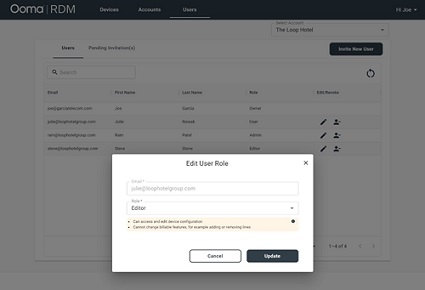Ooma Inc., a smart communications platform for businesses and consumers, announced a set of powerful management features, including API integration, for Ooma AirDial, its innovative POTS replacement solution.
Legacy copper-wire phone lines, also known as plain old telephone service or POTS, are reaching end of life as many carriers hike monthly rates and allow quality of service to slip. This creates significant challenges for safety equipment and business-critical systems that require a POTS line – ranging from fire alarm panels to elevator phones, fax machines, public safety phones, building access systems and more – that often can’t be migrated to voice over internet, or VoIP, service.
Ooma AirDial provides turnkey replacement for POTS lines by combining the AirDial base station with virtual analog phone service from Ooma, a data and voice connection through a nationwide wireless network, and cloud-based management with Ooma Remote Device Management (RDM), an online portal for monitoring and managing AirDial units in one place, from anywhere.
New management features added to AirDial include:
- API integration – Network managers can streamline workflows by passing AirDial status information and notifications into any monitoring tool that supports REST-based APIs. These integrations increase efficiency by combining AirDial monitoring with existing workflows in Network Operating Centers (NOCs).
- Roles-based access – There are now four levels of RDM access: owner, administrator, user and editor. Only owners and administrators, for example, can add and remove users, while editors can’t. This gives organizations flexibility in making RDM widely accessible without the risk of unintended changes.
- Call logs – RDM provides a log, updated in real-time, of all outbound and inbound calls on each phone line connected to an AirDial device. This is useful for troubleshooting, confirming that equipment is operational and establishing the time for crucial events such as 911 calls.
- Hunt groups – AirDial units can be configured to roll over an inbound call to one or more lines if the first line is busy, doesn’t answer or is offline. This is critical for certain use cases, such as on-premise PBXs in retail locations that have a single inbound phone number to reach the store. AirDial also allows setting the outbound Caller ID to a single number for calls made from multiple lines.
- Temperature readings – RDM now displays the internal temperature for individual AirDial devices, showing if the device is in a location that has become too hot or too cold.
- Number porting – Existing phone numbers for equipment connected to AirDial devices can be ported to Ooma from an RDM screen. This removes the need to contact Ooma customer support, accelerating the timeline when porting multiple phone numbers.
- Search – Administrators can now search RDM for individual AirDial devices by individual phone numbers, equipment labels, LTE status and more. This makes it easy, when managing large numbers of AirDial devices, to quickly find a relevant device or group of devices.
“POTS replacement can be complicated, but we are committed to making the process easy and quick with Ooma AirDial. We have been working hard to introduce features that support seamless installation, number porting, testing, and monitoring to ensure critical equipment connected to legacy POTS lines remains reliable.” said Thad White, vice president of product management at Ooma. “AirDial is superior among POTS replacement solutions in the efficiency and flexibility unlocked by our continuing expansion of Remote Device Management capabilities.”
To learn more about Ooma AirDial and POTS replacement, visit https://www.ooma.com/airdial.









